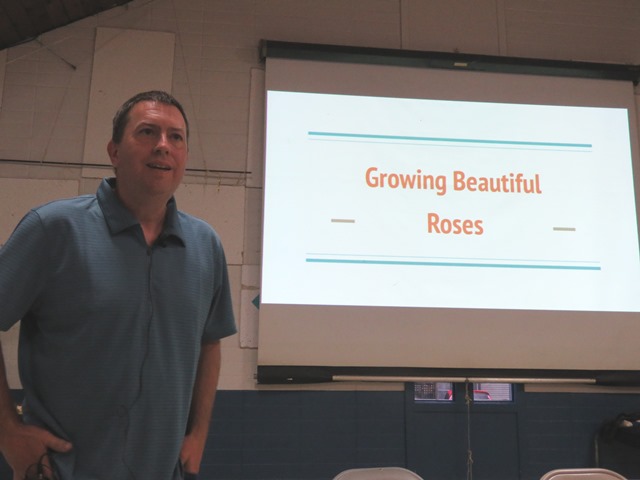

It was a real treat to welcome back Jason Croutch, owner of Fraser Valley Rose Farm, as our Speaker this month. Many of us recognized Jason from his Youtube videos or remember his presentation on Preserving Garden Worthy Roses back in April 2019. Jason’s passion is preserving heritage and rare unique roses but he also works with assortment of other interesting roses, such as Moss roses, unusual ornamentals, and permaculture plants.
As a starter, Jason let us know that we can all successfully grow roses if we have at least 6 hours full sun. More hours are better, but he reminded us that June and July usually have 16 hours!
Roses do NOT need perfect conditions and they don’t have to be isolated from other plantings. Good companion plants are Salvia, Lavender, Nepeta (catmint), and Apiaceae (Carrot family) among others. Most soil types are okay; big problems would include very rocky soil, tree roots, high pH, or poor drainage. Think about improving your whole garden not just the hole for the rose! Add organic matter and let it percolate down. If you are replacing a rose, the new rose should be planted at least a little ways from the old rose as it rebalances the nutrients. Even just refreshing soil in the hole is of benefit.
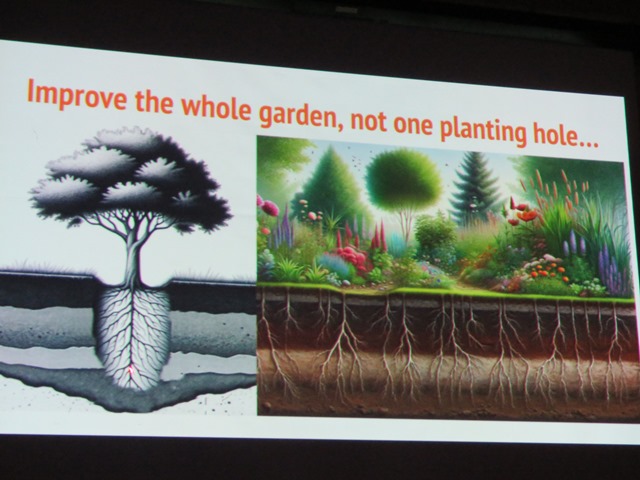

Jason suggests we think about our priorities when choosing a rose. What is your location and size of space; are you looking for repeat bloomers for taking cuttings; is fragrance important? For small spaces, consider miniatures, polyanthas, and floribundas. For larger spaces, good choices are David Austin shrubs, ramblers, hybrid teas. If you plan to take cuttings, solitary roses (hybrid teas, hybrid perpetuals, some modern climbers) are a good choice. If you want to fill in a corner, cluster roses (floribundas, grandifloras, hybrid musks, ramblers) would be better. Other considerations might be whether you are looking for hardiness: drought tolerant or cold hardy varieties. Jason suggested that you start off looking to see what is available, and then check the details on the “Help Me Find” website. It’s a great resource!
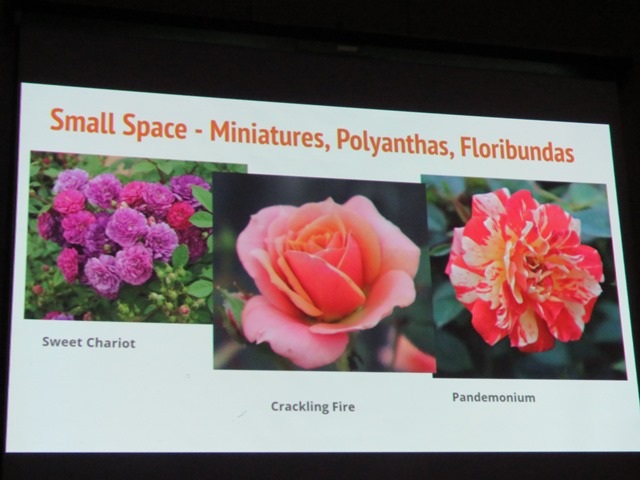
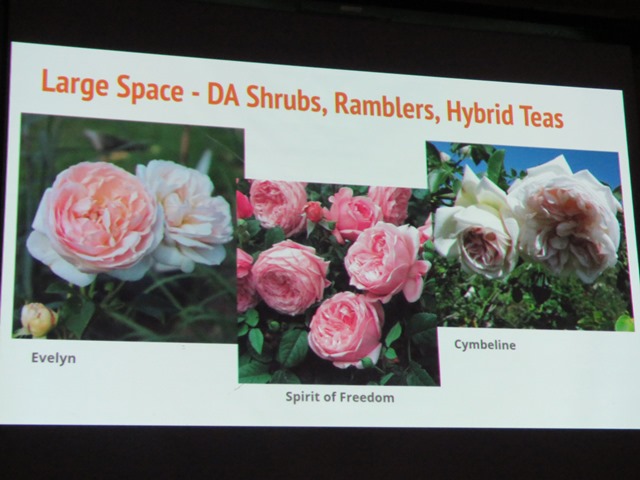
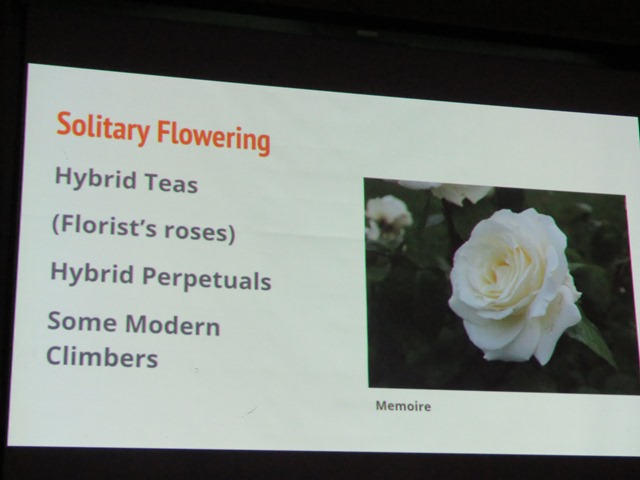
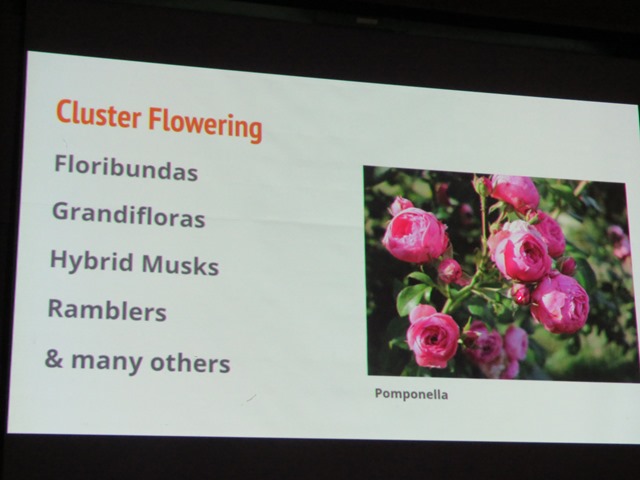
Another interest topic was the option of choosing roses grown from a cutting or those which were grafted. Grafted roses grow faster but the grafted is scar tissue and so these roses generally last 10 to 12 years. Roses grown from cuttings, on the other hand, can last decades! Grafted roses also might revert to the original, and after taking 2 years to bloom, you might end up with the wrong rose! A problem here is that some growers will not tell you whether the rose you buy is grafted or from a cutting. On the other hand there are a few roses that do not thrive well on their own roots. In the Florida climate, some grafted roses may be more disease resistant but that’s definitely not our climate!

Regarding nutrients, some products deliver poorly and liquid products are the worst. Watch out because not everything labeled as natural is beneficial. Soil management can be so complex and expensive! You need to be aware of your plants’ needs. Adding organic matter is always a good idea. Regarding “NPK”, what do roses really need? Jason suggests that plants don’t need as much phosphorous as we give them. Manufacturers give you what they think you want! Phosphorous, for example, accumulates in the soil and you may be adding it unnecessarily.
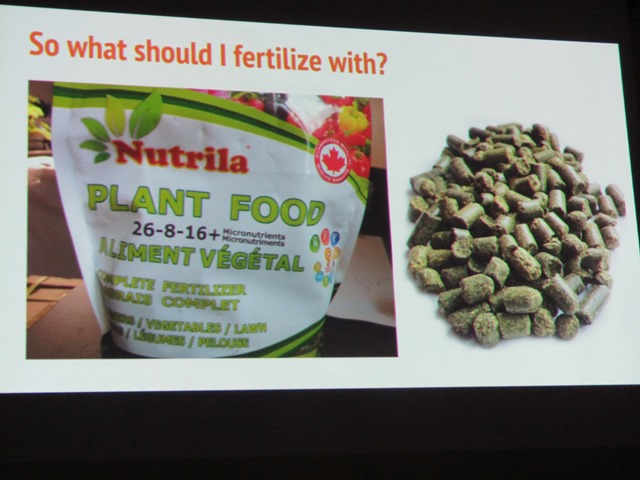
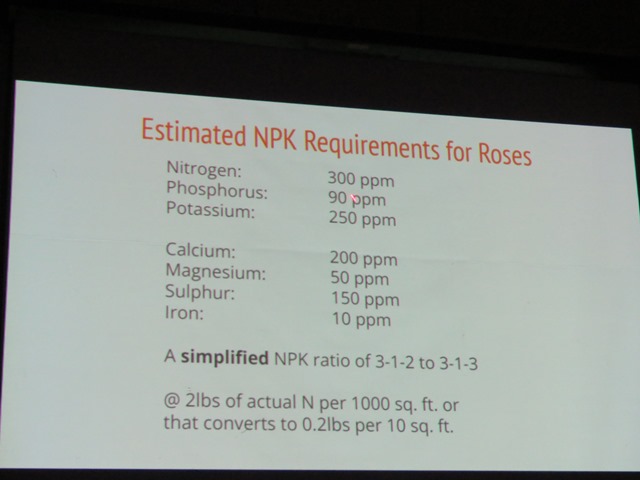
Here’s a surprise… Jason uses 3-0-2 alfalfa pellets or Nutrila (by Agribest) plant food. (Alfalfa can be obtained from animal feed stores. Nutrila is available on Amazon.) He also highly recommends adding organic matter, compost, or manure.
When fertilizing his garden, Jason adds some water both before fertilizing and afterwards. Be sure to water the roots of your roses, not the foliage, or you are encouraging black spot or powdery mildew. If the leaves are turning yellow or bronzing, it is usually spider mites. It could also be under watering, as a rose drops the underneath leaves first. For roses in pots, water lightly and then come back and water again several times until you see that the water is being absorbed. Roses in containers are often water stressed!
Pruning roses is important for size, shape, and health. You can prune early in the year or after blooming. Don’t worry about inward, outward; don’t worry about the “spring window”; just prune every year! Follow nature, and watch for when forsythia, quince, flowering currant, Saskatoon are blooming. 95% of your roses are repeat bloomers so wait to find out before pruning. If the rose blossom is fading, it’s good to snap off. The rule of thumb is to prune back to where the number of leaflets is normal. Look closely: often there are fewer leaflets near the buds, so see how many are below your buds. Many roses don’t know when to stop blooming, so if it is getting late in the year, don’t deadhead but let those rose hips develop.
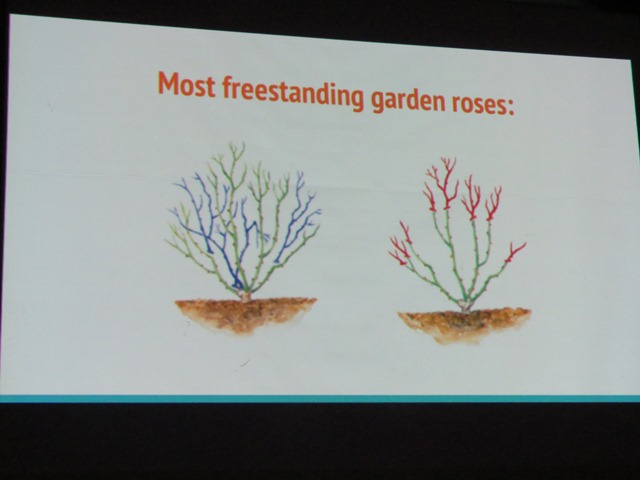

Jason prefers natural predators but if you have to, use insecticidal soaps. Note that soap only kills what it touches! BTW, did you realize that aphids are born pregnant? Think about natural predators: Aphideous wasps eat aphids, and Pirate bugs eat thrips. Garden sulfur is good for spider mites and reduces spores of powdery mildew and black spot. Horticultural oil is good for scale. Epsom salts is sometimes used as a quick fix, but only apply it if you need it. The magnesium can lock out calcium.
Blossom end rot on roses (and tomatoes) is a problem that Jason is often asked about. Popular myths that Jason does not recommend are rusty nails (nope!), burying fish (pests dig it up!), and eggshells (they don’t disintegrate very well). Jason advises that biodiversity is the best…don’t grow roses all by themselves! He likes to grow perennials along with his roses. Choose resistant varieties. Prune for air and sunshine. Water properly and remove infected leaves. Use sulfur and potassium bicarbonate when necessary.
Winter care is another important consideration. Stop fertilizing in August and limit your pruning. Clean up diseased foliage and shelter your potted roses. Replace mulch a needed.
Roses are such a wonderful but huge topic! Jason has created numerous Youtube videos which you can check out, as well as posts on Facebook and Instagram. Better yet, take a trip out to Mission and see his farm for yourself! (Open Fridays and Saturdays from 9am to 3pm.)

Thank you so much, Jason, for an inspiring presentation
on one of our favourite flowers in the garden!
RELATED LINKS
Jason’s Fraser Valley Rose Farm
https://www.fraservalleyrosefarm.com/
Help Me Find Resource
Roses, Peonies, Clematis and everything rose, peony and clematis related. (helpmefind.com)
Nutrila Fertilizer – made by Agribest (also available on Amazon)
https://agribest.ca/#aboutus
Alfalfa in the garden
https://learningandyearning.com/10-benefits-of-using-alfalfa-in-your-garden
Vancouver Rose Society
https://www.vancouverrosesociety.org/
Canadian Rose Society
https://canadianrosesociety.org/
Fraser Pacific Rose Society
https://www.fprosesociety.org/
Farmer’s Almanac
https://www.almanac.com/plant/roses



